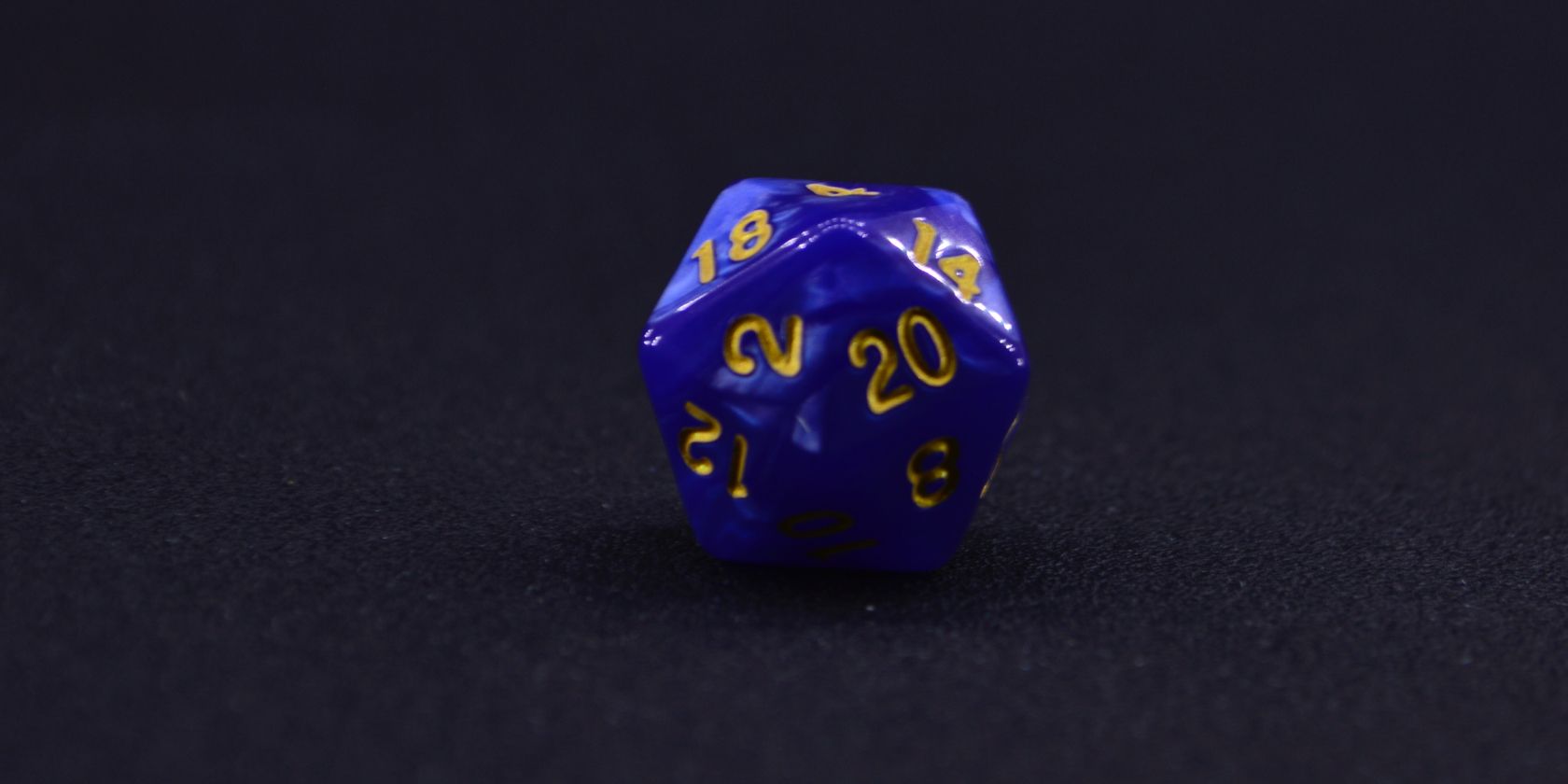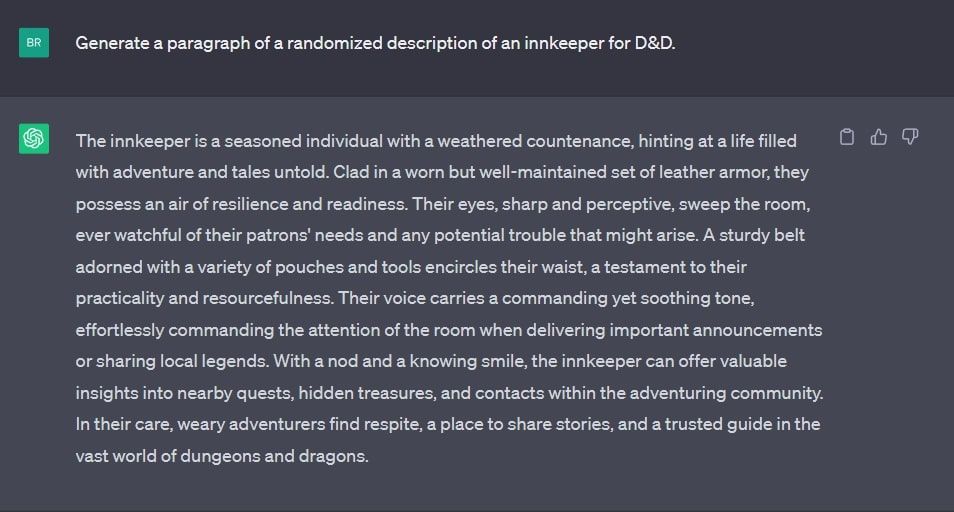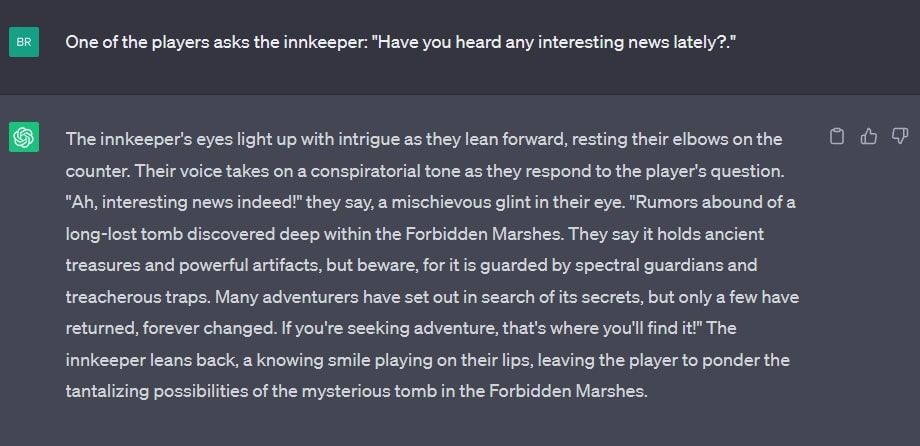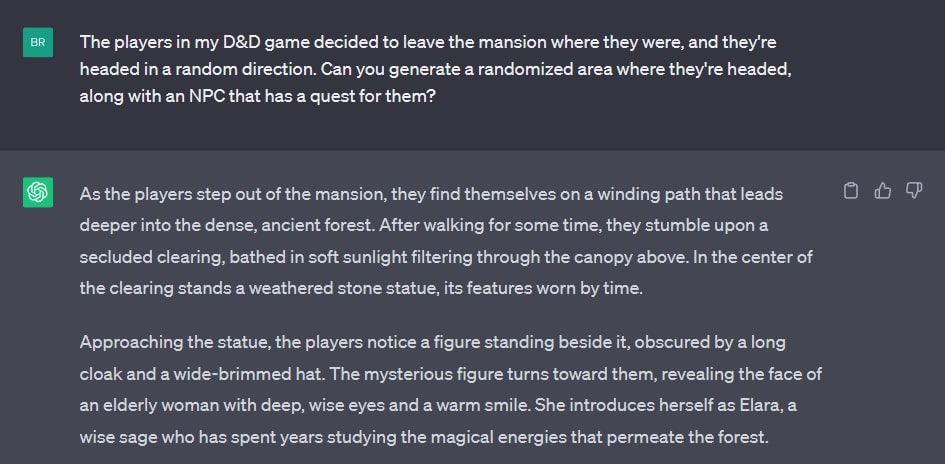
ChatGPT & Dungeons: 6 Secrets to Perfect Assistantship

ChatGPT & Dungeons: 6 Secrets to Perfect Assistantship
ChatGPT is a great tool for building stories and generating or expanding on creative ideas. With that in mind, did you know you can use it for enhancing your D&D campaigns?
Using ChatGPT as a dungeon master assistant is useful for both scripted and unscripted sessions! Keep reading for a quick look at how you can use ChatGPT to greatly improve your Dungeons & Dragons sessions.
1. Create Random Encounters While Players Are Traveling

Whether you’re strictly following a scripted adventure or mostly just going with the flow, ChatGPT can make it easy to add random encounters to your campaign. This is especially useful for when your players are traveling. It’s also a great addition for anyone learning how to play Dungeons & Dragons online .
Sure, it’s generally easy to add an encounter based on the context, like goblins showing up while the party’s resting because there’s a goblin encampment nearby. But you can spice the situation up by asking ChatGPT to create a random encounter that matches the players’ current levels.
The best approach is to prompt ChatGPT for the type and number of monsters and then build the context from there. Here’s an example of a prompt that works very well:
Please generate a random but fair encounter for a party of [x] players in D&D averaging level [x]. Keep the following in mind:
- The players are traveling through [location in the campaign].
- The players are the following classes [x].
- Make sure to exclude [monsters, enemies, types of monsters, and enemies].
- Make sure to limit the number of monsters/enemies that appear to [number].
- Provide the stats for each monster/enemy.
There are plenty of additional commands you could add to this prompt for additional details. However, this serves as a great boilerplate. Keep in mind that the more details on the context you provide, the easier it will be for ChatGPT to tie its output to your campaign.
2. Create NPCs and Generate Dialogue
If you’re struggling to create NPCs for your campaign, ChatGPT can not only help expedite the process but also spark your creativity. Best of all, after generating NPCs, you can have ChatGPT answer in their place, making dialogue much more interesting.
Here’s a pretty great prompt for generating NPCs:
- Generate a paragraph of a randomized description of an innkeeper for D&D.

Here’s how you can prompt dialogue from players to interact with characters created in ChatGPT:
- One of the players asks the innkeeper: “Have you heard any interesting news lately?”

Of course, you can swap out multiple variables in each prompt to adjust them to your campaign and situation. For extra flair, you can use ChatGPT and DALL-E to generate images of characters .
3. Filler Content in a Pinch: When Players Deviate From the Story
You’ve probably run into a situation where your players decide to deviate from a carefully crafted campaign. While ChatGPT can’t help with the frustration this can cause, it can help you with filler content in a pinch. It’s a fantastic option for creating engaging content on the fly and avoiding awkward or long pauses during the session.
Here’s one example of a prompt that can work:
- The players in my D&D game decided to leave the mansion where they were, and they’re headed in a random direction. Can you generate a randomized area where they’re headed, along with an NPC that has a quest for them?

Here, ChatGPT automatically generated an easy-to-understand environment, an NPC with a name, and a quest to boot. All of this within seconds. The next time your party surprises you by taking a new direction, ChatGPT has you covered.
4. ChatGPT Can Assist in Map Creation
You can use ChatGPT to describe an area to your party better or build a room for an encounter. In fact, there are two great ways to use ChatGPT to generate maps.
First, you can use it to create art prompts for Midjourney, which would then design your map idea for you. Typically, you’ll have to add the grid afterwards.
Alternatively, you can use ChatGPT for map creation by prompting for ideas. You can provide the basics of your idea for a foundation, and ChatGPT will provide you with and elaborate on the details.
5. Keep Track of the Game State
If you’ve been running a campaign for more than 15 sessions, you might consider using ChatGPT as a D&D assistant to keep track of the game state. It might take some work and a bit of time, but it’s definitely worth it. And in many cases, it’s better than managing a complex spreadsheet and a tall stack of notes.
The way to prompt here is somewhat lengthy but simple. You’ll want to review all your notes and write out the most important details. Then, right before every session, copy and paste that information after opening with the following prompt:
“Please refer to the following information any time I ask you a question. It’s a summary of all the most important information for my D&D campaign so far, and you’ll serve as an assistant for when I need to remember details about the campaign, players, monsters, or other information.”
If you’re not too happy with the answers from this prompt, there are a few ways to write effective ChatGPT prompts that you might consider implementing. A cheat sheet can really help you tweak prompts to better fit the context of your campaign.
6. Provide Guidance and Feedback for New DMs
Guidance and feedback from ChatGPT can take place in or outside a session. During a session, you can use ChatGPT to quickly double-check rules and look up information regarding classes, races, abilities, items, and more. It’s also a definite lifesaver in complicated battle scenarios.
For new DMs, though, it’s a great way to get some feedback on ideas and session summaries. For the prompt, you can write out a summary of what happened, and ask if the events that took place made sense, followed the rules, and if there’s anything that could have been done better.
Improve Your D&D Experience With ChatGPT
ChatGPT, with the right prompts, can greatly improve your D&D experience by functioning as an efficient dungeon master assistant, whether you’re just getting started or you’re a veteran dungeon master. Assisting with map and environment creation, NPC dialogue, guidance and feedback after sessions, and generating random events are just a few examples.
There are, of course, a plethora of other ways to use ChatGPT to improve your D&D sessions. With the right prompt, you can even run a solo RPG campaign in ChatGPT with additional instructions to test out ideas from a player’s perspective.
- Title: ChatGPT & Dungeons: 6 Secrets to Perfect Assistantship
- Author: William
- Created at : 2024-07-12 03:12:39
- Updated at : 2024-07-13 03:12:39
- Link: https://games-able.techidaily.com/chatgpt-and-dungeons-6-secrets-to-perfect-assistantship/
- License: This work is licensed under CC BY-NC-SA 4.0.